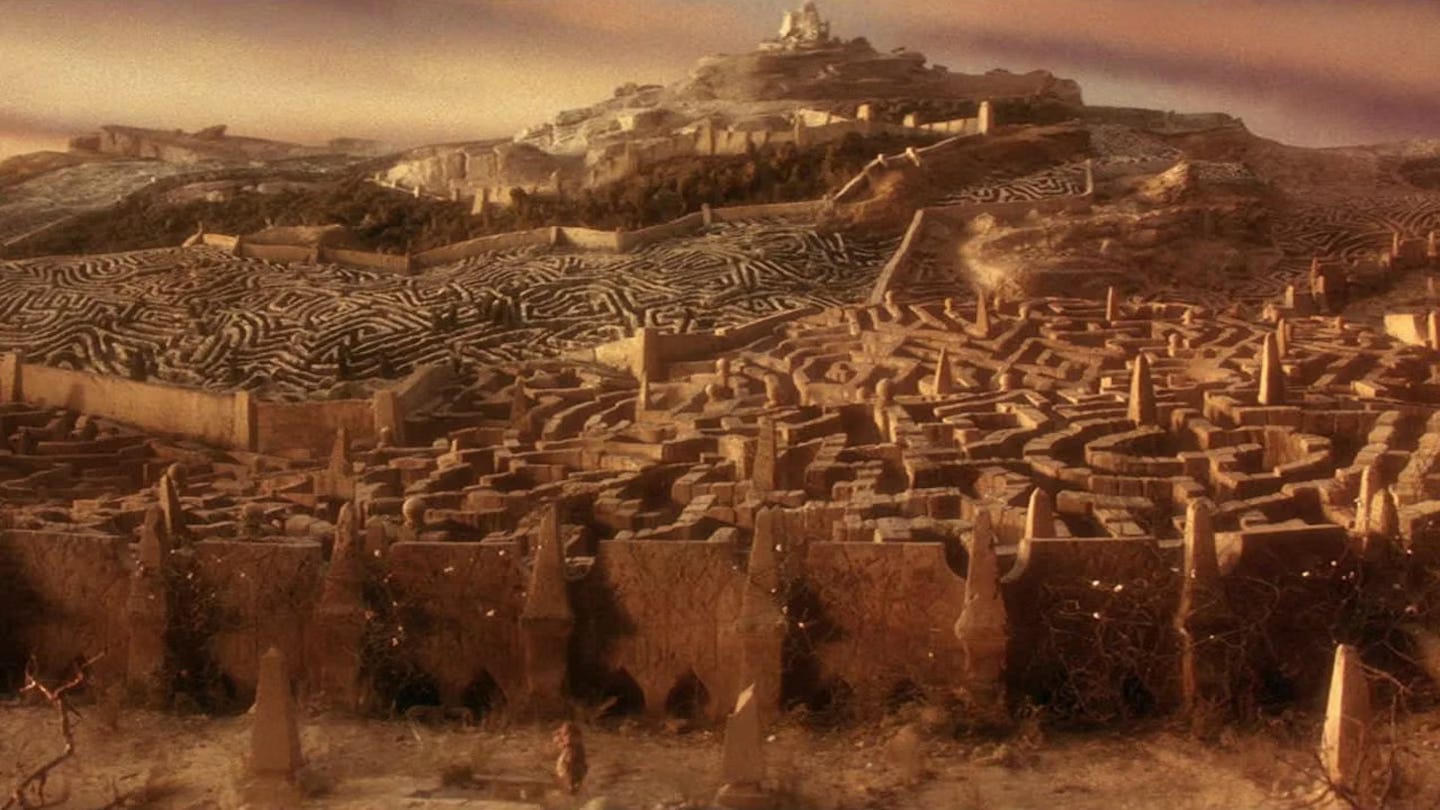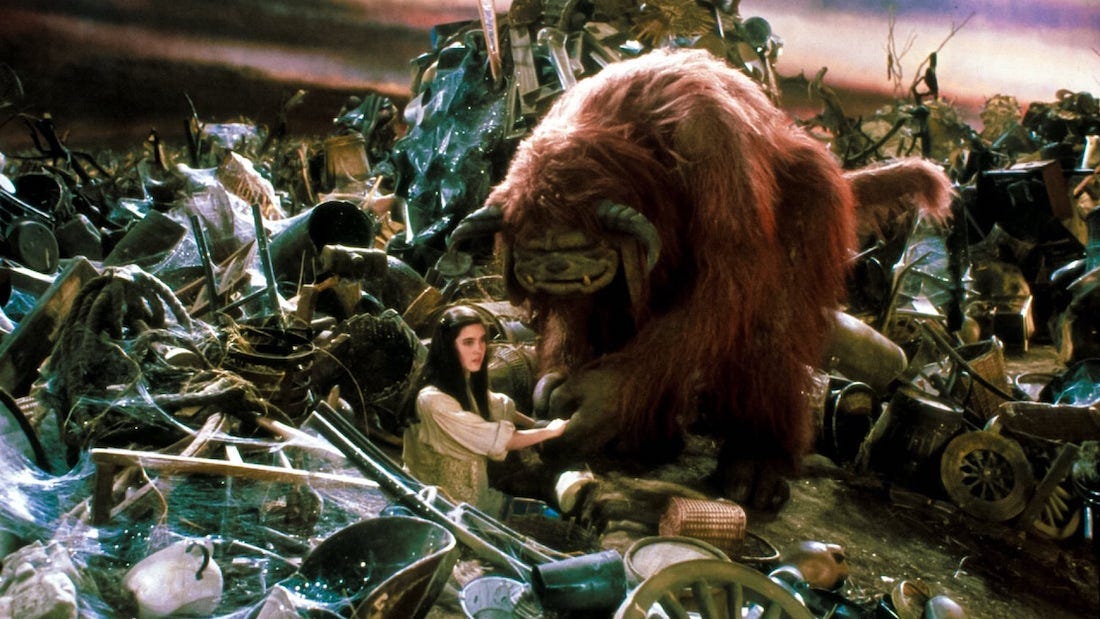Note: my Wednesday posts are typically reserved for paying subscribers, but I’m sending this one to everyone today, just for fun. If you would like to support me in writing, basically, whatever the hell I feel like writing, I occasionally manage a real zinger. Sunday posts remain free, while Wednesday posts are behind a paywall and not unlike one of those priced brown gift bags whose contents are a surprise to everyone.
My favorite movie as a child from about the ages of 8-11 was the 1986 film The Labyrinth. My sister and I watched it so many times that I had the entire script memorized.
It’s a film by Jim Henson and produced by George Lucas staring David Bowie (who wrote all the music, and who legitimately scared/fascinated me — his distinctive voice and eerie synthesized keyboard chords still takes me back to the feeling of dread his character instilled in me) and a 14-year-old Jennifer Connelly.
Even by today’s standards, it’s a pretty impressive movie.
I rewatched it this past week with my family, expecting that I might cringe all the way through it and wind up feeling very embarrassed by my enthusiasm. And while there were some definite eye roll-inducing moments, overall, I still thought it was an excellent movie.
(An anecdotal aside: before The Labyrinth, the movie my sister and I watched non-stop was Babes in Toyland, another 1986 movie, a remake staring Drew Barrymore and Keanu Reaves. That one was terrible once I rewatched it as an adult. It was in the VCR when our house was robbed, which I’m sure was at least a small silver lining for our parents.)
While some of the green screen effects are laughably obvious, the genius involved in creating the world of this movie is a testament to what I see as humanity’s biggest strengths: creativity and cooperation.
But watching a childhood favorite film is different as an adult. You know more, you understand more, you have more cultural, social, economic references.
You now see the main character as a child from above, not a “big kid” from below.
The basic premise of the film is as follows: Sarah is a 16-year-old who is somehow ravenously beautiful and also odd and kind of a loner, and also, I now recognize, a bit of a brat.
She wears princess dresses and flower crowns, and is the kind of girl who would put a lot of effort into her costume for the Renaissance Festival. She also has a book called The Labyrinth (fun bit of trivia: the book in the movie is fictional, but did become a book after the movie) that she seems to be trying to memorize, especially these lines:
Through dangers untold and hardships unnumbered, I have fought my way here to the castle beyond the Goblin City, to take back the child that you have stolen. For my will is as strong as yours, and my kingdom is as great...
“You have no power over me” is the crucial line that she can’t seem to remember.
One night, her father and step-mother go on a date, and she must take care of her baby brother, which she is not happy about. It’s storming, he’s crying, and she’s frustrated. So far, 100% realistic.
Then, in her frustration, she decides to summon the Goblin King to take the baby away. And he does. She immediately regrets her decision when the magic works. Jareth, the Goblin King (played, of course, by David Bowie), takes the baby to his castle in the center of the labyrinth, and gives Sarah 13 hours to get to him. If she does, she can have him back; if she doesn’t, he gets to keep the baby.
Then the bulk of the movie, as I’m sure you know or can guess, is her working her way through the labyrinth, getting helped and hindered by strange creatures. As she gets closer, Jareth makes increasingly desperate attempts to stop her, including drugging her, until she finally reaches the castle. Then, in an Escher-like stairwell, both the Goblin King and her little brother just out of reach, he makes one last attempt at preventing the departure of her and Toby, the baby: “Look what I’m offering you: your dreams…just let me rule you, and you can have everything that you want.”
Now, I have some questions that still haven’t been answered, mainly:
What did Jareth want with the baby? To make him a goblin, or to be his heir?
When she walks through a door and falls down into a dungeon,* was that the door to the castle, or to “certain death”? She didn’t die, and she did eventually get to the castle, but was it an extra-scary round-about route, or did she escape death? Or maybe the fellows who told the riddle were both lying?
What did he want with Sarah? For her to be his subject, or his queen? He seemed scared of her realizing that he “had no power over her,” so his subject (I guess), though he did seem to try to be seducing her when she was drugged, so I don’t know. It’s a kid’s movie.
I think it is my fate now to see every story as a metaphor for the dangers of valuing capital over human well-being and relationships.
Where are the similarities?
“It’s not fair!” Sarah says this a lot, and it’s true. It’s not fair. I have few illusions regarding justice being a reasonable expectation in life, BUT there are many things that could be fair with just a little good faith effort. In the movie, trap doors could not be installed in the forest floor; in our lives, we could not bankrupt entire families even when they have expensive insurance because a member got sick.
“Things aren’t always what they seem.” It makes me cringe a little when she says this as if it were some huge revelation, but this phrase comes up several times throughout the movie as Sarah becomes wisened to her new surroundings. As far as I’m concerned, its a maxim and a reminder of the necessity critical thinking…something that our modern surroundings seems to be hell-bent on beating out of us.
*“One of us always lies, and one of us always tells the truth!” “He always lies.” “I do not, I tell the truth!” “Oh, what a lie!” This part of the movie is a riddle: Sarah stands before two doors guarded by strange two-headed creatures, and must figure out which door leads to the castle, and which door leads to “certain death.” My partner and I spent a while the other day trying to figure out the riddle (Sarah supposedly does, but to quote one of the heads, “I’ve never understood it.”)
I mentioned it to my sister, and she had another thought: “I think they’re both lying.” Alternatively, neither of them even know if they’re lying or not. And if that’s not our experience right now with AI (trust us, but everything we say might be bullshit and there’s no “we” to know for sure or not anyway), then I don’t know what else is.
“Look what I’m offering you: your dreams…just let me rule you, and you can have everything that you want.” This is very weird. What does he want? The baby? Her? Just power in general? What does it mean to “rule her”?
As a cynical adult, the answer now seems a little more obvious: “let my own proposal become the sea we all swim in, please, and I will give you a prize within that new reality for letting me get away with it.” But like capitalism, the prize can never be what we truly want and need, like human connection and cooperation; it can only be material.
At first, he almost gets her: Sarah’s presented with “treasure” after treasure during her drug-induced trip, and at first, she clutches each item to her as the junk lady tries to assure her that each thing is indeed the thing she’s been looking for but can’t remember.
But then, Sarah comes to: “It’s all junk.”
And she is saved.










